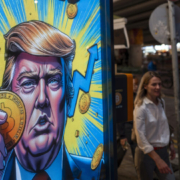The great reversal: US isolation, innovation, and the new global order
As the world races towards the next financial frontier, the United States (US) appears to be accelerating and braking at the same time. This past week, the US Congress tabled a package of cryptocurrency legislation that clarifies long-awaited regulatory grey areas: Splitting oversight responsibilities between the Commodity Futures Trading Commission and the Securities and Exchange Commission, and setting out clearer rules for stablecoins. These moves should, in theory, unlock innovation and foster financial inclusion through decentralised finance and tokenised assets. But tucked inside the package is something far more consequential: An outright ban on a US central bank digital currency (CBDC).
This is not just regulatory conservatism; it is a reversal of global momentum. While more than 100 countries are either developing or researching CBDCs, the US has effectively removed itself from this wave of digital transformation. The justification? A deeply libertarian mistrust of government surveillance, ironically juxtaposed against a broader erosion of financial privacy already occurring in traditional systems. In short, while the US clings to its role as global reserve currency issuer, it risks being leapfrogged by an evolving multilateral digital order.
This is not the only area where the US is pulling back from the global stage. At the G20 Finance Summit in South Africa, US Treasury Secretary Scott Bessent was notably absent. This undercut aims to strengthen multilateralism and address critical issues like African debt relief and infrastructure funding.
Washington’s increasingly transactional posture is nowhere more evident than in its tariff policy. In Quarter 2 alone, US customs revenue surged to a record $64 billion, much of it driven by Trump-era protectionism. Remarkably, few countries have retaliated, wary of disrupting trade flows with the world’s largest consumer market. Domestically, these tariffs are feeding into inflation, especially as the US simultaneously dismantles its green energy ambitions. Trump’s “Big Beautiful Bill” has gutted federal support for renewables, while boosting fossil fuel subsidies. At the same time, US trade policy all but bans affordable Chinese electric vehicles and batteries, even as US automakers struggle to offer competitive alternatives. In this context, the US looks set to remain a petrostate for the foreseeable future, handing Beijing leadership in the clean energy race.
The Federal Reserve (Fed), too, finds itself under political siege. Trump’s open musings about firing Fed Chair Jerome Powell sent markets into a tailspin. While the legal framework makes such a move difficult, the threat alone has rattled confidence in the central bank’s independence. With Powell’s term ending in 2026, and markets already pricing in political risk, we may be entering an era where US monetary policy is seen as partisan and unstable.
Meanwhile, elite investment funds like Vy Capital (key backers of Elon Musk’s ventures) are closing their doors to outside money after years of spectacular returns. This signals two things: That venture capital is becoming more insular, and that high-net-worth investors are consolidating power and innovation within ever more exclusive ecosystems. This does not bode well for broader financial inclusion.
Global peers are not faring much better. In Japan, inflation has overtaken wages, pushing voters towards populist promises of tax cuts and cash handouts ahead of the impending election. With government debt already at 235% of the gross domestic product, such fiscal loosening could rattle bond markets, which are already showing signs of strain.
What ties these stories together is a common thread: Retreat. Whether it is the US stepping back from global digital leadership, Japan resorting to fiscal populism, or the undermining of independent institutions, the world’s largest economies seem increasingly focused inward.
In this new economic order, success may not hinge on domination but on cooperation. The countries that choose partnership over isolation, innovation over ideology, and credibility over chaos, will shape the future.
This article has been published on Moneyweb.





